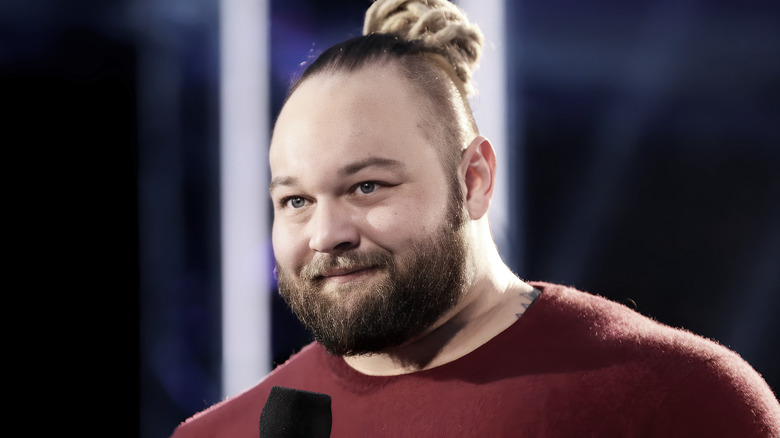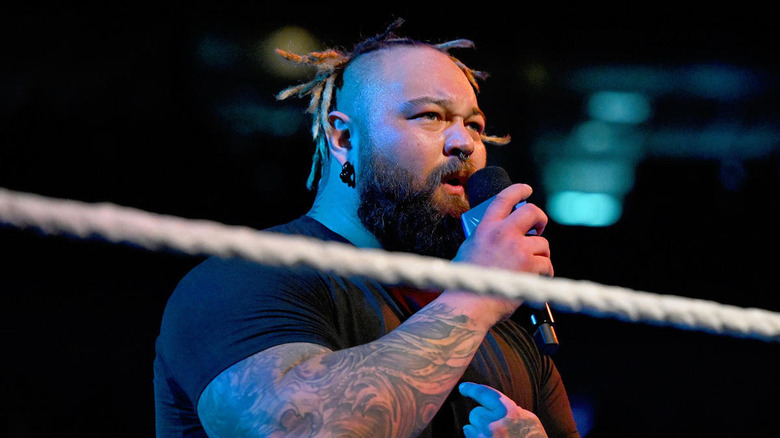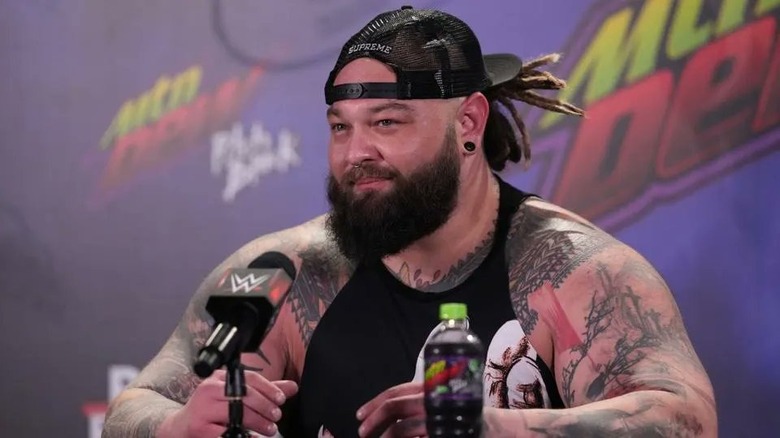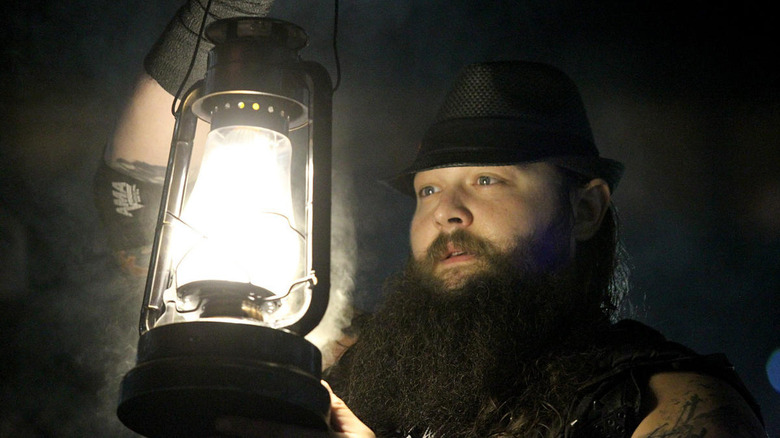What WWE Fans Lost In Windham Rotunda, Bray Wyatt
Why is this one hitting so hard?
I didn't know Bray Wyatt — not even a little bit. Never met him. Never interviewed him. Never had him sign something for me. Obviously his sudden and untimely passing is terrible for his friends and co-workers, and particularly terrible for his family, his wife, his young children. I am not one of those people. I sympathize, of course, but what I'm feeling now is more than just the abstract empathy of strangers, where the only thing to say is the tired, rote entreaty to cherish the time spent with your loved ones (as though this is something I would ever forget to do).
Is it because he was young? Other wrestlers have died young. Lots of them. Too many. Brodie Lee was 41 when he died, just five years older than his former Wyatt Family stablemate. Daffney was 46. Hana Kimura was only 22. And those three are just from the last three years — wrestlers who died young are deeply embedded in the industry's mythology, from the Von Erichs to Bruiser Brody to Owen Hart. Mourning the performers who left us too soon has sadly become part of being a wrestling fan.
A fan. That's what I am. I watched almost the entirety of Bray Wyatt's career, going back to his days as Husky Harris in Season 2 of what I half-lovingly and half-mockingly refer to as "Game Show NXT." I was a fan of him, specifically, even back then, and while I fell out of love with wrestling (or at least WWE) pretty hard in the early 2010s, I remember the early Wyatt Family vignettes being one of the things that piqued my interest as I unwittingly prepared to return. Once I was back, I was absolutely hooked on Bray, and remained hooked on him until the day he died. Part of becoming a wrestling fan again involved becoming a Bray Wyatt fan.
Nothing new
But again, this isn't new. I was a fan of Lance Cade and Umaga and Ashley Massaro. I was a fan of Test and Larry Sweeney and Shad Gaspard. I was a huge fan of Lee. This feels worse than those deaths, somehow. This cuts deeper, more along the lines of the pain I felt when Eddie Guerrero died. Is it simply a matter of stature? A bigger name, a more beloved star, a stronger impact? That feels wrong. That's not the reason. Or at least, it's not the entire reason. It's just one facet, one aspect of the true source of the pain, just one color of black among many.
This is the truth: It's not just that I, as a fan, lost Bray Wyatt. It's that wrestling lost Bray Wyatt.
That was part of what hit me hard about Eddie — he was one of the all-time greats, and he had more greatness to give, and wrestling lost that. Obviously any wrestler who dies young is robbing the industry of their potential greatness, but with Eddie, it wasn't just potential. It was real, we'd seen it; it was past, not future. That's where the stature comes in. It's worse, somehow, when you say to yourself, "I have seen this person achieve greatness; I will never see them achieve greatness again."
Even then, though, this is different. Eddie Guerrero was great in a very specific, very traditional sense, i.e. he was great in the ring. What we lost when he died, what wrestling lost, was the potential for more incredible wrestling matches of the kind he had already spent his career performing. To be sure, he was great on the mic, too, and his character work was exceptional, but he was very much a professional wrestler in the manner of any other professional wrestler. He was among the very best at executing that model, but he wasn't in the business of breaking it.
A disruptor
Bray Wyatt very much was in the business of breaking it. He said as much every time they put a mic in his hand — he was something new, he was the revolution, he was the oncoming storm that would sweep away the old and the tired and the corrupt. He was a supernatural character, but one unlike any that had come before, wielding magic with mere words, magic that scoffed at the crudeness of Kane's fire or The Undertaker's lightning. He was an excellent in-ring talent, but that excellence was almost incidental. When you think of Bray Wyatt, you don't think of his matches. You think of his promos, his video packages, all the things he did outside the ring that made what he did inside the ring matter.
More than anything, though, you think of his failures, which means you're also thinking of his ambitions. All the things he tried to do to push wrestling in new directions, to reach new horizons in the industry, only to fall short. The Wyatt compound invasion. The House of Horrors. WrestleMania 33. The Ultimate Deletion. Eventually, even The Fiend. Every time, it seemed, he was slapped back down by the harsh realities of the wrestling industry and the cold contempt of Vince McMahon.
Many fans shared that contempt, believing Wyatt was a bad in-ring worker, or a self-destructive creative mind that could conceptualize but never execute. Even what some would consider Wyatt's creative triumphs, like the Firefly Fun House match against John Cena at WrestleMania 36, received their share of derision, and that cinematic masterpiece certainly didn't save Wyatt's job when he was fired a year later. And when he returned, refreshed and ready to tell a new story in WWE, his final attempt at doing something different was slathered in blacklight paint and slapped with a Mountain Dew logo while the audience sat on their hands.
The return that will never be
And yet, if the reports are to be believed, he was getting ready to come back. He was going to try again. What wrestling lost when Bray Wyatt died was not his future wrestling matches, but his ceaseless attempts at pushing wrestling in a direction it had never gone before. And unlike others who hold such ambitions, he was actually capable of doing it. He had clout, he had a fandom, his ideas could potentially be realized on the biggest stage wrestling has. There was nobody else in the business with both his degree of creativity and the influence necessary to make his dreams (or, more likely, his nightmares) a reality, and it's unclear whether there ever will be again.
Wrestling is in a boom period right now, but it's also in a period defined by nostalgia. The Bloodline isn't a new story; it's an old story that's being exceptionally well-executed. When innovation occurs in a promotion like AEW, it occurs in the ring, as wrestlers attempt increasingly impressive and creative spots in an era where pretty much everyone pulls out a Canadian Destroyer sometimes. At the top level of the industry, only Bray Wyatt was pushing in the other direction, trying to see what he could do with his character, his backstory, his presence, that nobody had done before. He failed over and over again, but he always tried. That's what wrestling lost yesterday — a man who wouldn't stop until he had revolutionized pro wrestling, and didn't care what anyone thought of him in the meantime. A force for change. A force for evolution. An emissary of the future, not the past.
That's gone now. If Bray Wyatt's death hits harder than most, it's because it wasn't just his own roads not taken that have been sealed off forever. It was a unique path forward for wrestling, the possibility of something new, always flickering but constantly alight, finally snuffed, like blowing out the flame in a lantern.



